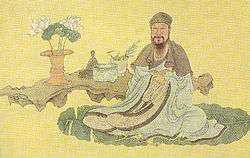Bai Juyi
| Bai Juyi | |||||||||||||||||||||||||
|---|---|---|---|---|---|---|---|---|---|---|---|---|---|---|---|---|---|---|---|---|---|---|---|---|---|
|
Portrait of Bai Juyi by Chen Hongshou | |||||||||||||||||||||||||
| Born |
772 Taiyuan, Shanxi, China | ||||||||||||||||||||||||
| Died |
846 Xiangshan Temple, Longmen (Luoyang), Henan, China | ||||||||||||||||||||||||
| Occupation | Poet, Government official | ||||||||||||||||||||||||
| Chinese name | |||||||||||||||||||||||||
| Chinese | 白居易 | ||||||||||||||||||||||||
| |||||||||||||||||||||||||
| Korean name | |||||||||||||||||||||||||
| Hangul | 백거이 | ||||||||||||||||||||||||
| |||||||||||||||||||||||||
| Japanese name | |||||||||||||||||||||||||
| Hiragana | はくきょい | ||||||||||||||||||||||||
| |||||||||||||||||||||||||
Bai Juyi (also Bo Juyi or Po Chü-i; Chinese: 白居易; 772–846) was a renowned Chinese poet and Tang dynasty government official. Many of his poems concern his career or observations made about everyday life, including as governor of three different provinces. Burton Watson says of Bai Juyi: "he worked to develop a style that was simple and easy to understand, and posterity has requited his efforts by making him one of the most well-loved and widely read of all Chinese poets, both in his native land and in the other countries of the East that participate in the appreciation of Chinese culture. He is also, thanks to the translations and biographical studies by Arthur Waley, one of the most accessible to English readers".[1] Bai was also influential in the historical development of Japanese literature.[2] His younger brother Bai Xingjian was a short story writer.
Name variants
| Names | |
|---|---|
| Chinese: | 白居易 |
| Pinyin: | Bó Jūyì or Bái Jūyì |
| Wade-Giles: | Po Chü-i or Pai Chü-i |
| Zì (字): | Lètiān (樂天; Lo-t'ien in Wade-Giles) |
| Hào (號): | Xiāngshān Jūshì (香山居士; Hsiang-shan Chu-shih in Wade-Giles) Zuìyín Xiānshēng (醉吟先生; Tsui-yin Hsian-sheng in Wade-Giles) |
| Shì (謚): | Wén 文 (hence referred to as Bái Wéngōng (白文公; Pai Wen-kung in Wade-Giles)) |
Bai Juyi often referred to himself in life as Letian (Wade-Giles: Lo-t'ien), roughly the equivalent of "happy-go-lucky". Later in life, he referred to himself as the Hermit of Xiangshan.
Life
Bai Juyi lived during the Middle Tang period. This was a period of rebuilding and recovery for the Tang Empire, following the An Lushan Rebellion, and following the poetically flourishing era famous for Li Bai (701-762), Wang Wei (701-761), and Du Fu (712-770). Bai Juyi lived through the reigns of eight or nine emperors, being born in the Dali regnal era (766-779) of Emperor Daizong of Tang. He had a long and successful career both as a government official and a poet, although these two facets of his career seemed to have come in conflict with each other at certain points. Bai Juyi was also a devoted Chan Buddhist.[3]
Birth and childhood
Bai Juyi was born in 772 in Taiyuan, Shanxi, which was then a few miles from location of the modern city, although he was in Zhengyang, Henan for most of his childhood. His family was poor but scholarly, his father being an Assistant Department Magistrate of the second-class.[4] At the age of ten he was sent away from his family to avoid a war that broke out in the north of China, and went to live with relatives in the area known as Jiangnan, more specifically Xuzhou.
Early career
Bai Juyi's official career was initially successful. He passed the jinshi examinations in 800. Bai Juyi may have taken up residence in the western capital city of Chang'an, in 801. Not long after this, Bai Juyi formed a long friendship with a scholar Yuan Zhen. Bai Juyi's father died in 804, and the young Bai spent the traditional period of retirement mourning the death of his parent, which he did along the Wei River, near to the capital. 806, the first full year of the reign of Emperor Xianzong of Tang, was the year when Bai Juyi was appointed to a minor post as a government official, at Zhouzhi, which was not far from Chang'an (and also in Shaanxi province). He was made a member (scholar) of the Hanlin Academy, in 807, and Reminder of the Left from 807 until 815, except when in 811 his mother died, and he spent the traditional three-year mourning period again along the Wei River, before returning to court in the winter of 814, where he held the title of Assistant Secretary to the Prince's Tutor.[5] It was not a high-ranking position, but nevertheless one which he was soon to lose.
Exile
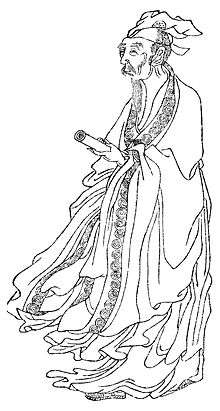
While serving as a minor palace official in 814, Bai managed to get himself in official trouble. He made enemies at court and with certain individuals in other positions. It was partly his written works which led him into trouble. He wrote two long memorials, translated by Arthur Waley as "On Stopping the War", regarding what he considered to be an overly lengthy campaign against a minor group of Tatars; and he wrote a series of poems, in which he satirized the actions of greedy officials and highlighting the sufferings of the common folk.[6]
At this time, one of the post-An Lushan warlords (jiedushi), Wu Yuanji in Henan, had seized control of Zhangyi Circuit (centered in Zhumadian), an act for which he sought reconciliation with the imperial government, trying to get an imperial pardon as a necessary prerequisite. Despite the intercession of influential friends, Wu was denied, thus officially putting him in the position of rebellion. Still seeking a pardon, Wu turned to assassination, blaming the Prime Minister, Wu Yuanheng, and other officials: the imperial court generally began by dawn, requiring the ministers to rise early in order to attend in a timely manner; and, on July 13, 815, before dawn, the Tang Prime Minister Wu Yuanheng was set to go to the palace for a meeting with Emperor Xianzong. As he left his house, arrows were fired at his retinue. His servants all fled, and the assassins seized Wu Yuanheng and his horse, and then decapitated him, taking his head with them. The assassins also attacked another official who favored the campaign against the rebellious warlords, Pei Du, but was unable to kill him. The people at the capital were shocked and there was turmoil, with officials refusing to leave their personal residences until after dawn.
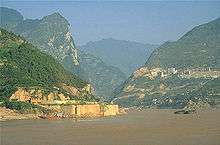
In this context, Bai Juyi overstepped his minor position by memorializing the emperor. As Assistant Secretary to the Prince's Tutor, Bai's memorial was a breach of protocol — he should have waited for those of censorial authority to take the lead before offering his own criticism. This was not the only charge which his opponents used against him. His mother had died, apparently caused by falling into a well while looking at some flowers, and two poems written by Bai Juyi — the titles of which Waley translates as "In Praise of Flowers" and "The New Well" — were used against him as a sign of lack of Filial Piety, one of the Confucian ideals. The result was exile. Bai Juyi was demoted to the rank of Sub-Prefect and banished from the court and the capital city to Jiujiang, then known as Xun Yang, on the southern shores of the Yangtze River in northwest Jiangxi Province. After three years, he was sent as Governor of a remote place in Sichuan.[7] At the time, the main travel route there was up the Yangzi River. This trip allowed Bai Juyi a few days to visit his friend Yuan Zhen, who was also in exile and with whom he explored the rock caves located at Yichang. Bai Juyi was delighted by the flowers and trees for which his new location was noted. In 819, he was recalled back to the capital, ending his exile.[8]
Return to the capital and a new emperor
In 819, Bai Juyi was recalled to the capital and given the position of second-class Assistant Secretary.[9] In 821, China got a new emperor, Muzong. After succeeding to the throne, Muzong spent his time feasting and heavily drinking and neglecting his duties as emperor. Meanwhile, the temporarily subdued regional military governors, jiedushi, began to challenge the central Tang government, leading to the new de facto independence of three circuits north of the Yellow River, which had been previously subdued by Emperor Xianzong. Furthermore, Muzong's administration was characterized by massive corruption. Again, Bai Juyi wrote a series of memorials in remonstrance.
As Governor of Hangzhou
Again, Bai Juyi was sent away from the court and the capital, but this time to the important position of the thriving town of Hangzhou, which was at the southern terminus of the Grand Canal and located in the scenic neighborhood of West Lake. Fortunately for their friendship, Yuan Zhen at the time was serving an assignment in nearby Ningbo, also in what is today Zhejiang, so the two could occasionally get together,[9] at least until Bai Juyi's term as Governor expired.
As governor of Hangzhou, Bai Juyi realised that the farmland nearby depended on the water of West Lake, but, due to the negligence of previous governors, the old dike had collapsed and the lake had dried out to the point that the local farmers were suffering from severe drought. He ordered the construction of a stronger and taller dike, with a dam to control the flow of water, thus providing water for irrigation, relieving the drought, and improving the livelihood of the local people over the following years. Bai Juyi used his leisure time to enjoy the beauty of West Lake, visiting the lake almost every day. He ordered the construction of a causeway to allow walking on foot, instead of requiring the services of a boat. A causeway in the West Lake (Baisha Causeway, 白沙堤) was later referred to as Bai Causeway in Bai Juyi's honour, but the original causeway built by Bai Juyi named Baigong Causeway (白公堤) no longer exists.
Life near Luoyang
In 824, Bai Juyi's commission as governor expired, and he received the nominal rank of Imperial Tutor, which provided more in the way of official salary than official duties, and he relocated his household to a suburb of the "eastern capital," Luoyang.[10] At the time, Luoyang was known as the eastern capital of the empire and was a major metropolis with a population of around one million and a reputation as the "cultural capital," as opposed to the more politically oriented capital of Chang'an.
Governor of Suzhou
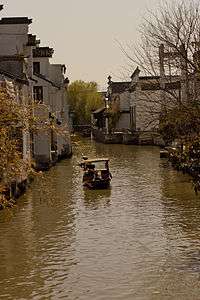
In 825, at the age of fifty-three, Bai Juyi was given the position of Governor (Prefect) of Suzhou, situated on the lower reaches of the Yangtze River and on the shores of Taihu Lake. For the first two years, he enjoyed himself with feasts and picnic outings, but after a couple years he became ill and was forced into a period of retirement.[11]
Later career
After his time as Prefect of Hangzhou (822-824) and then Suzhou (825-827), Bai Juyi returned to the capital. He then served in various official posts in the capital, and then again as prefect/governor, this time in Henan, the province in which Luoyang was located. It was in Henan that his first son was born, though only to die prematurely the next year. In 831 Yuan Zhen died.[11] For the next thirteen years, Bai Juyi continued to hold various nominal posts but actually lived in retirement.
Retirement
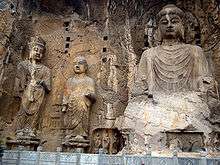
In 832, Bai Juyi repaired an unused part of the Xiangshan Monastery, at Longmen, about 7.5 miles south of Luoyang. Bai Juyi moved to this location, and began to refer to himself as the "Hermit of Xianshang". This area, now a UNESCO World Heritage Site, is famous for its tens of thousands of statues of Buddha and his disciples carved out of the rock. In 839, he experienced a paralytic attack, losing the use of his left leg, and became a bedridden invalid for several months. After his partial recovery, he spent his final years arranging his Collected Works, which he presented to the main monasteries of those localities in which he had spent time.[12]
Death
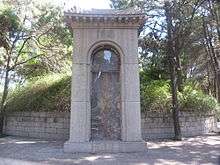
In 846, Bai Juyi died, leaving instructions for a simple burial in a grave at the monastery, with a plain style funeral, and to not have a posthumous title conferred upon him.[13] He has a tomb monument in Longmen, situated on Xiangshan across the Yi River from the Longmen cave temples in the vicinity of Luoyang, Henan. It is a circular mound of earth 4 meters high, 52 meters in circumference, and with a 2.80 meter high Monument inscribed "Bai Juyi".
Works
Bai Juyi has been known for his plain, direct, and easily comprehensible style of verse, as well as for his social and political criticism. Besides his surviving poems, several letters and essays are also extant.
History
One of the most prolific of the Tang poets, Bai Juyi wrote over 2,800 poems, which he had copied and distributed to ensure their survival. They are notable for their relative accessibility: it is said that he would rewrite any part of a poem if one of his servants was unable to understand it. The accessibility of Bai Juyi's poems made them extremely popular in his lifetime, in both China and Japan, and they continue to be read in these countries today.
Famous poems

Two of his most famous works are the long narrative poems "Chang hen ge" ("Song of Everlasting Sorrow"), which tells the story of Yang Guifei, and "The Song of the Pipa Player". Like Du Fu, he had a strong sense of social responsibility and is well known for his satirical poems, such as The Elderly Charcoal Seller. Also he wrote about military conflicts during the Tang Dynasty. Poems like "Song of Everlasting Regret" were examples of the peril in China during the An Lushan rebellion.
Bai Juyi also wrote intensely romantic poems to fellow officials with whom he studied and traveled. These speak of sharing wine, sleeping together, and viewing the moon and mountains. One friend, Yu Shunzhi, sent Bai a bolt of cloth as a gift from a far-off posting, and Bai Juyi debated on how best to use the precious material:
About to cut it to make a mattress,
pitying the breaking of the leaves;
about to cut it to make a bag,
pitying the dividing of the flowers.
It is better to sew it,
making a coverlet of joined delight;
I think of you as if I'm with you,
day or night.[1]
- ^ Hinsch, 80-81
Bai's works were also highly renowned in Japan, and many of his poems were quoted and referenced in The Tale of Genji by Murasaki Shikibu.[14]
Poetic forms
Bai Juyi was known for his interest in the old yuefu form of poetry, which was a typical form of Han poetry, namely folk ballad verses, collected or written by the Music Bureau.[15] These were often a form of social protest. And, in fact, writing poetry to promote social progress was explicitly one of his objectives.[15] He is also known for his well-written poems in the regulated verse style.
Critical appraisal
Bai Juyi is considered one of the greatest Chinese poets, but even during the ninth century, sharp divide in critical opinions of his poetry already existed.[16] While other poets like Pi Rixiu only had the highest praise for Bai Juyi, others were hostile, like Sikong Tu (司空圖) who described Bai as "overbearing in force, yet feeble in energy (qi), like domineering merchants in the market place."[16] Bai's poetry was immensely popular in his own lifetime, but his popularity, his use of vernacular, the sensual delicacy of some of his poetry, led to criticism of him being "common" or "vulgar". In a tomb inscription for Li Kan (李戡), a critic of Bai, poet Du Mu wrote, couched in the words of Li Kan: "...It has bothered me that ever since the Yuanhe Reign we have had poems by Bai Juyi and Yuan Zhen whose sensual delicacy has defied the norms. Excepting gentlemen of mature strength and classical decorum, many have been ruined by them. They have circulated among the common people and been inscribed on walls; mothers and fathers teach them to sons and daughters orally, through winter's cold and summer's heat their lascivious phrases and overly familiar words have entered people's flesh and bone and cannot be gotten out. I have no position and cannot use the law to bring this under control."[17]
Bai was also criticized for his "carelessness and repetitiveness", especially his later works.[18] He was nevertheless placed by Tang poet Zhang Wei (張為) in his Schematic of Masters and Followers Among the Poets (詩人主客圖) at the head of his first category: "extensive and grand civilizing power".[18]
See also
References
- Hinsch, Bret. (1990). Passions of the Cut Sleeve. University of California Press.
- Hinton, David (2008). Classical Chinese Poetry: An Anthology. New York: Farrar, Straus, and Giroux. ISBN 0-374-10536-7 / ISBN 978-0-374-10536-5.
- Owen, Stephen (2006). The Late Tang: Chinese Poetry of the Mid-Ninth Century (827-860). Harvard University Asia Center. pp. 45–. ISBN 978-0-674-03328-3.
- Nienhauser, William H (ed.). The Indiana Companion to Traditional Chinese Literature. Indiana University Press 1986. ISBN 0-253-32983-3
- Arthur Waley, The Life and Times of Po Chü-I, 772-846 A.D (New York,: Macmillan, 1949). 238p.
- Waley, Arthur (1941). Translations from the Chinese. New York: Alfred A. Knopf. ISBN 978-0-394-40464-6
- Watson, Burton (1971). Chinese Lyricism: Shih Poetry from the Second to the Twelfth Century. (New York: Columbia University Press). ISBN 0-231-03464-4
Notes
- ↑ Watson, 184.
- ↑ Arntzen, S (2008) A Shared Heritage of Sensibility?: The Reception of Bai Juyi's Poetry in Japan. Paper presented at the conference Japan-China Cultural Relations at the University of Victoria, 25th Jan.
- ↑ Hinton, 266
- ↑ Waley (1941), 126-27.
- ↑ Waley (1941), 126- 130
- ↑ Waley (1941), 130
- ↑ Waley (1941), 130-31, Waley refers to this place as "Chung-chou".
- ↑ Waley (1941), 130-31
- 1 2 Waley (1941), 131
- ↑ Waley (1941), 131. Waley refers to this village as "Li-tao-li."
- 1 2 Waley (1941), 132
- ↑ Waley (1941), 132-33
- ↑ Waley (1941), 133
- ↑ Bai Juyi (Chinese poet) from Britannica
- 1 2 Hinton, 265
- 1 2 Owen (2006), pg. 45
- ↑ Owen (2006), pg. 277
- 1 2 Owen (2006), pp. 45-47, 57
External links
| Wikilivres has original media or text related to this article: |
- Works by Juyi Bai at Project Gutenberg
- Works by or about Bai Juyi at Internet Archive
- Works by Bai Juyi at LibriVox (public domain audiobooks)

- Bai Juyi: Poems — English translations of Bai Juyi's poetry.
- Translations of Chinese poems
- Chinese poems in translation
- Six Bai Juyi's poems included in 300 Selected Tang Poems, translated by Witter Bynner
- Article on the Shanghai Oriental Pearl Tower that was based on a poem by Bai Juyi
